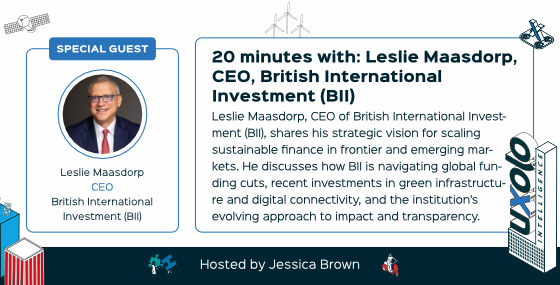Growing the African carbon credit pot
The Africa Carbon Markets Initiative (ACMI) has secured $650 million of commitments for future carbon credits at the inaugural Africa Climate Summit. And given Africa’s voluntary carbon market is currently generating only 2% of what it could, the potential is vast - but so are the challenges.
The first wave of Africa Carbon Market Initiative’s (ACMI) promised multi-million-dollar deals has landed with the UAE Carbon Alliance agreeing to buy $450 million of carbon credits and Climate Asset Management – a joint venture between HSBC Asset Management and Pollination – also announcing a $200 million investment.
ACMI was co-launched by SEforALL, UNECA, and GEAPP at COP27 in 2022 and set out to dramatically increase the continent’s carbon credit production to 300 million annually by 2030. This is no small task: according to the inaugural report, Africa’s voluntary carbon markets currently generate only 2% of their maximum potential.
Facing the challenge
When commentators talk about Africa’s carbon markets, they often cite a wealth of renewable resources waiting to be unlocked. As Paul Muthaura, interim CEO of ACMI, says: “Africa has huge potential as an exporter of a range of commodities that will enable the world to transition to net zero. Critical metals, battery storage components, reforestation and avoided deforestation, wind, geothermal, hydrogen and solar renewable energy to name a few.”
But the system is plagued by capacity issues which inhibit project development. Getting a carbon credit is a laborious process with international verifiers required to fly in, running up severely high transaction costs. The issue is worsened by the abyss of national-level carbon credit traceability, monitoring, reporting, auditing or taxation programmes. Limited pricing data is also making it challenging for buyers to recognise fair pricing, and for suppliers to manage risk during projects without knowing how much buyers will ultimately pay for credits.
According to ACMI, projects in Africa have an average of 2-7 years from start date to first credit issuance, meaning a significant amount of initial, external investment is required before returns come in. Under these conditions, developers face a big challenge to finance new projects, especially those needing extensive feasibility studies like geothermal.
DFIs and MDBs struggle to mobilise nearly enough private capital comfortable shouldering the country, counterparty, project, physical, and market risk of new projects. Filling the $170 billion infrastructure investment gap demands a bankable project pipeline and that requires sector reforms – to inadequate tariff systems, to weak government utilities, to project supervisory and regulatory institutions – which carbon credits are not designed to resolve.
ACMI plans to address this deficit by conducting active reach out and sensitisation activities which can mobilise developers, and by supporting the development of flagship projects with nascent methodologies like savannah fire management or agroforestry projects with smallholder farmer stakeholders. It also plans to work with governments to draw up VCM activations plans, set national targets and clarify regulation. The risk associated with these projects hasn’t been really addressed in the roadmap report.
Private investors will also face a revenue challenge from governments: earlier this year, Zimbabwe declared it wanted half of all offset proceeds to go to state coffers. The move was inspired by the feeling that governments and local communities were losing out on the financial rewards of offset programmes.
To improve project transparency, some sovereigns are trying to tackle the industry’s regulatory afflictions. Malawi has set up an agency to do so and Kenya has passed legislation that means host communities will receive 40% of profit generated from land-based emissions offset projects. Zambia may also follow its neighbour’s lead.
According to Hanaan Marwah, Chief Strategy & Investment Officer at KOKO Networks, 2022 and 2023 have marked a “turning point” for carbon market regulation: “I can see cabinet-level and climate advisors joining key meetings with senior African government ministers”.
On top of project development constraints, financing cannot be understated as a barrier to African governments meeting their NDC commitments – the gap is around $2.4 billion between now and 2030 – which is currently out of the reach of many government budgets, and DFI and MDB coffers.
Carbon markets are raising capital: ACMI has managed to secure $650 million in commitments, and Kenya held its first-ever carbon offsets auction in June 2023, organised by the Regional Voluntary Carbon Market Company (RVCMC), where 1.4 million tonnes of carbon credits were purchased by Saudi Arabia companies.
Muthaura says “the priority in all circumstances must be the leverage of private sector financing … there must be concerted efforts to unlock private capital at scale and carbon markets are able to do just that, alongside other financing tools in the toolbox.”
Non-traditional renewables startups – a better route?
While major renewables project development can present complex hurdles, there are a number of carbon revenue-based startups, including Nigeria’s Powerstove Energy, Kenya’s BURN Manufacturing, and KOKO Networks, which have begun to reach scale in the embryonic market. They represent a new avenue for investment. For example, KOKO Networks operates a bio-ethanol distribution network, priced 30-40% cheaper than charcoal, across Kenya with over a million customers. The operation tackles the clean cooking crisis and prevents deforestation by providing a long term, affordable supply of a sustainable and healthy fuel which is a real replacement for charcoal and firewood – it is a whole-system approach. Marwah believes “this is exactly how carbon markets were designed to work”.
Such initiatives might be the way to entice DFIs to put resources into backing non-traditional renewables industries involved in the carbon markets, as they have so far been remarkably absent from the space. Marwah believes this is due to them being “very new” to carbon markets and likely not seeing enough companies at scale to have considered much debt or equity financing.
ACMI has plans to encourage DFIs, as well as philanthropies and NGOs, to continue funding early-stage projects and blended finance programmes but doesn’t mention their involvement in carbon markets directly. Notably, the majority of project examples cited in the roadmap report are actually relatively new renewables technologies: for example, Octavia Carbon, a Kenyan company building machines that filter CO2 from air using direct air carbon capture technology; and Cella, an early-stage carbon mineralization company that provides durable storage services to direct air capture companies – the company turns CO2 into rock naturally and stores it away forever.
The Uxolo perspective
ACMI has set out some big ambitions: ‘by 2050, ACMI aims to establish carbon credits as one of Africa’s top export commodities, bringing in $100-200 billion and retiring 1.5-2.5 gigatonnes of CO2’. And the message is clear – just seeing carbon credits as a financing tool for major renewables projects misses the broader impact carbon credits could have as an export commodity. But a clear message is no less challenging to get across.





